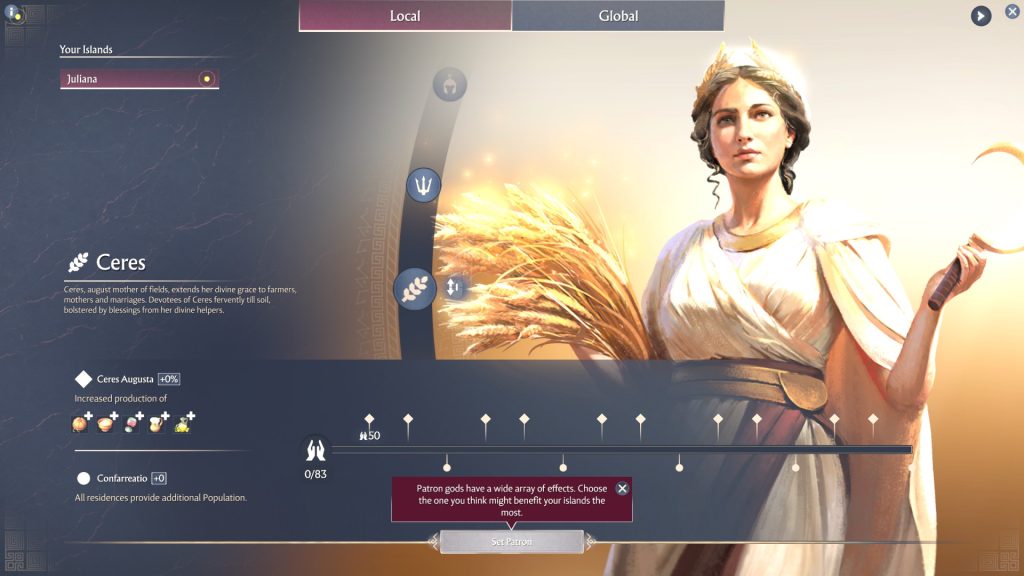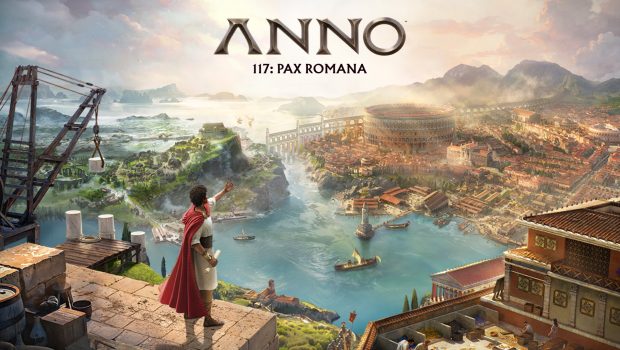Anno 117: Pax Romana PC Story Campaign Preview – Plebian Pleased
I’m a big fan of city-building and real-time strategy (RTS) games, yet Anno was always a series that evaded my new release radar. With Pax Romana, it now has my undivided attention.
ImpulseGamer was fortunate to play an Early Access build of Anno 117: Pax Romana ahead of its official launch on November 13th for PC and current-gen consoles. If you love city builders and think about the Roman empire daily, our early impressions are this is the game for you.
We had full access to play the first 4-hours of Pax Romana’s compelling single-player campaign, which puts you in the role of a Roman governor tasked with restoring the destroyed island of Juliana, which was ravaged by a volcano eruption some years ago. Despite the ruined grand coliseum and scattered villages, the region contains fertile plains, rolling fields and Azure waters that rival central Latium and that are, naturally, ripe for re-building the area for a new generation.
The Governor you play as isn’t faceless, either, but a defined character who you get to choose between: Marcus, a gentle-spoken second son of a powerful Roman family, or his sister Marcia, forced to marry the assigned governor and put into an unlikely appointment over Juliana despite being a woman. I chose Marcus (to save Marcia’s more interesting premise for the full launch version) and was quite surprised to find the writing and voice-work fairly engaging, given many city-builders haven’t quite delivered in the narrative department. The tone is not tightly bound to historical authenticity or the less savory realities of Roman politics, but it finds a nice balance.
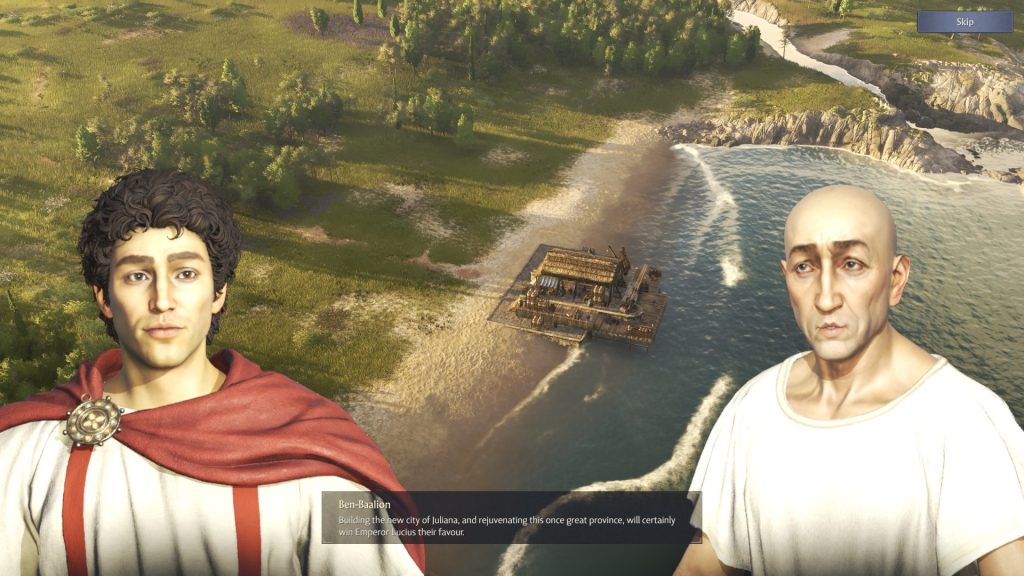
I can see the sometimes whimsy humour and less-than-subtle references to popular Roman historical figures may not land with everyone, but the game’s stellar visual presentation does a lot of the heavy lifting. Both Marcus and Marcia are expressive and animated during key story cutscenes, even if they and major NPCs are essentially just talking portraits while you build your new empire over the classic top-down perspective. Aside from some strange facial expressions, the game’s vivid artstyle makes these scripted story moments top-notch.
But it’s the city-building I was here for, and Anno 117: Pax Romana’s story campaign does a great job of easing you into the basics of the game without over-tutorialising. You start with a trading post and the general goal to increase the region’s working population and production centers, which means building houses and constructing buildings such as lumber mills, farms and fisheries. Each building has their own radius that determines either their effectiveness (such as having enough trees surrounding a mill) or what other buildings in the area receive their benefits (such as a library imparting knowledge or a market providing income). Having never played an Anno title before, the basic loop felt well-paced and fun to plan out as I envisioned my future empire among the hills and mountains, and mapped out the citizen’s quarter and farms with the roads necessary to link up my working quarter with the heart of my domain.
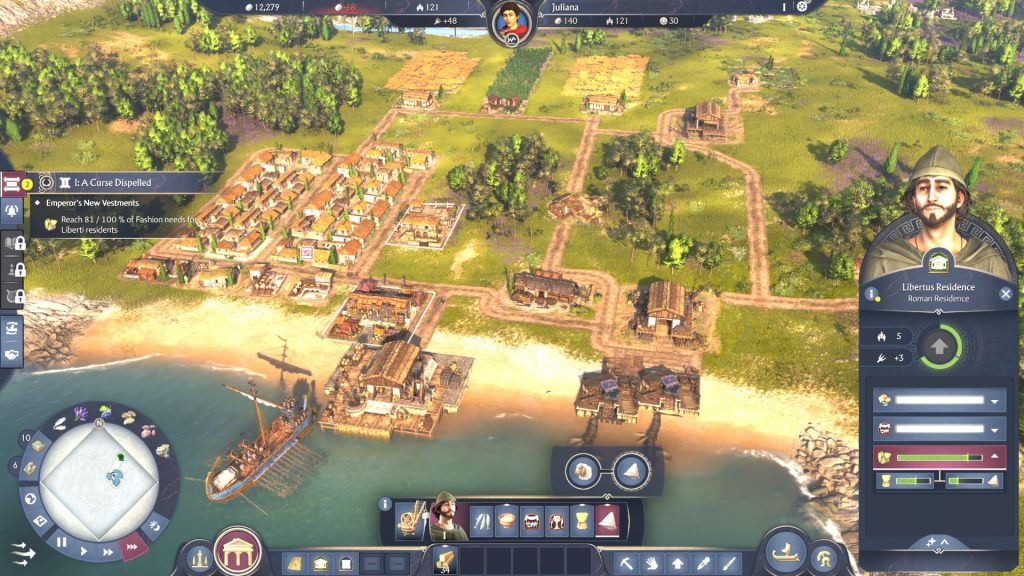
Your initial workforce is made up of the working-class Liberti, but meeting their needs, such as ensuring they have adequate housing and are well-fed and clothed with buildings tailored to their class (my boys need their rowdy taverns and rough-spun tunics, after all) allows for upgrading them to the next class, the Plebians, who introduce more refined building options for goods production and public services (Garum is all the rage in Rome, didn’t you hear)?
The early and mid-game, even in the campaign mode, is centered around careful resource gathering and management (wood and tiles) and getting a solid production line up-and-running to avoid burning through all the starting funds. I made a few rookie errors like building houses too far away from my public services, which provide bonuses to citizens living within a certain radius, and upgrading too many of my working class Liberti. Thankfully, Pax Romana lets you re-position everything as you expand your settlement without incurring additional costs, which made it easier to relax and play the game and not worry so much about my aesthetic vision.
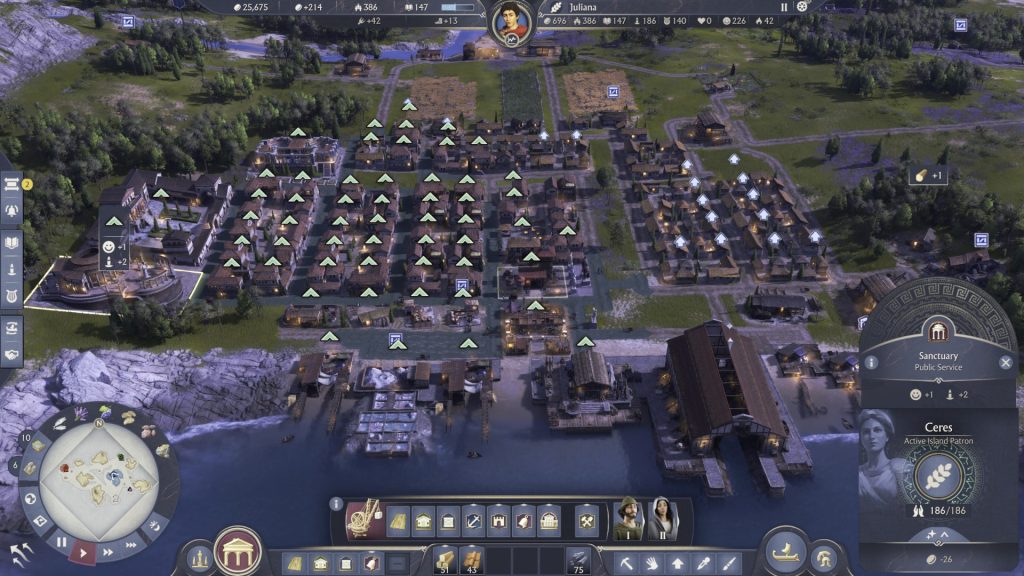
It didn’t take me long to find the blend of city-building, long-term strategic planning, scripted story quests and naval exploration quite addictive. This early tutorial phase was full of story moments which demanded I sail Marcus up and down the various islands in the region to meet Emperor Lucius for dinner, play errand boy to find his wayward daughter Diana, and gather raw resources to help the Emperor prepare for a big celebration at his estate.
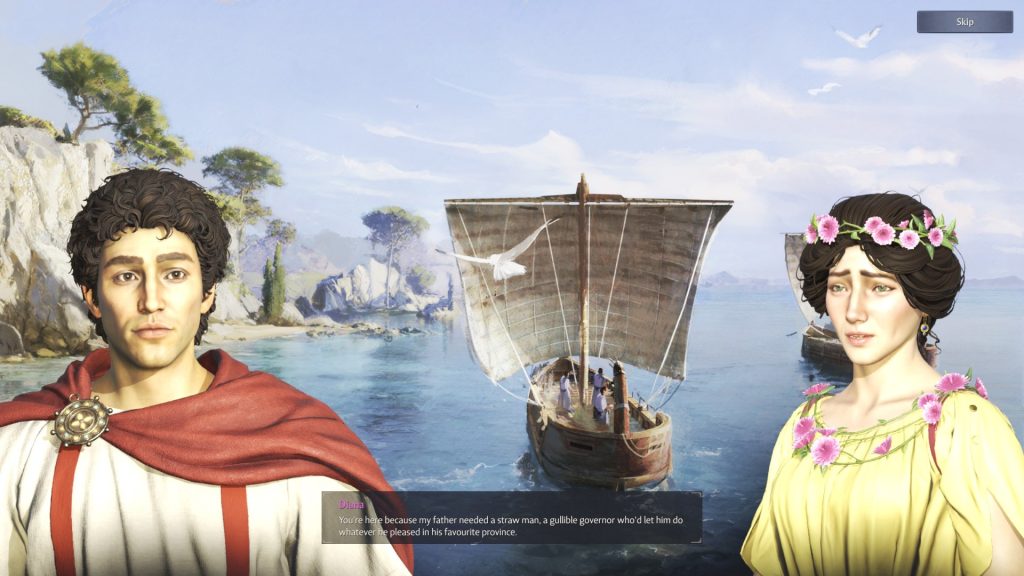
Pax Romana also weaves in some moments of player choice, letting you ask additional questions for further lore or respond to story moments, such as paying or lying about not having enough money to fulfill the Emperor’s sudden demand for 5000 Denarii.
I was intrigued by the consequences of my choice but didn’t get to see it during my preview time. However, I did get to enjoy some random encounters, which let you respond to events such as a Libertus citizen bringing in a load of goods, which I had the option of seizing, purchasing or simply wishing him well. These dynamic events added a bit of flavour to my four-hour playthrough, and I’m looking forward to seeing what sort of conundrums the base game offers to spice up the general gameplay loop for both sandbox and campaign on launch.
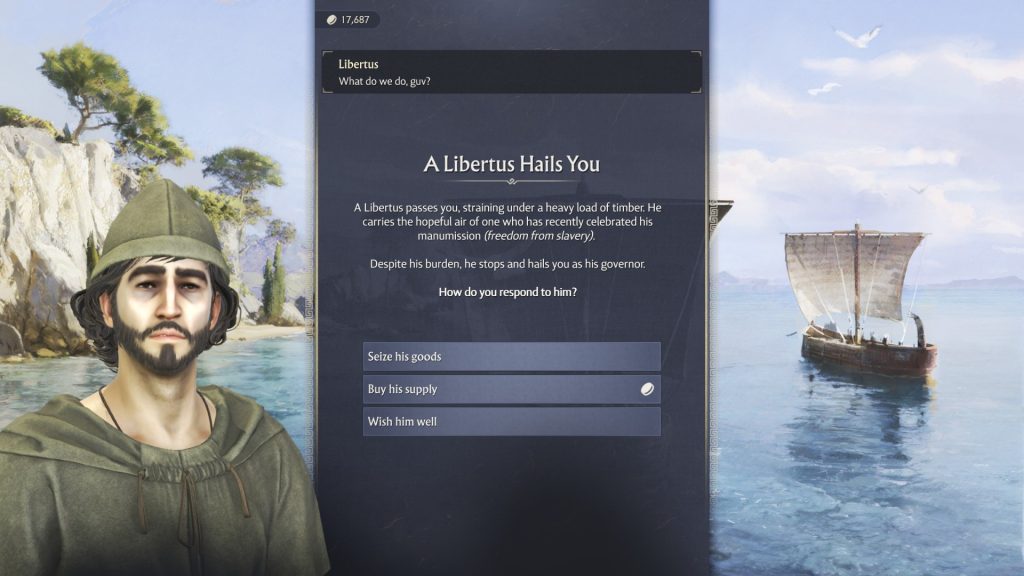
The latter half of the preview slice of the campaign ramps up the narrative stakes, but I was too busy getting lost in the deity menu, which lets you choose a particular Roman god to worship for certain bonuses (I picked Ceres because I’m all about the abundance of Garum), and the dedicated research tree, which allows you to tailor your focus based around Economic, Civic, or Military discoveries. You can unlock entire new buildings, bonus effects for existing ones, and, crucially, new military units, as this game offers combat, too!
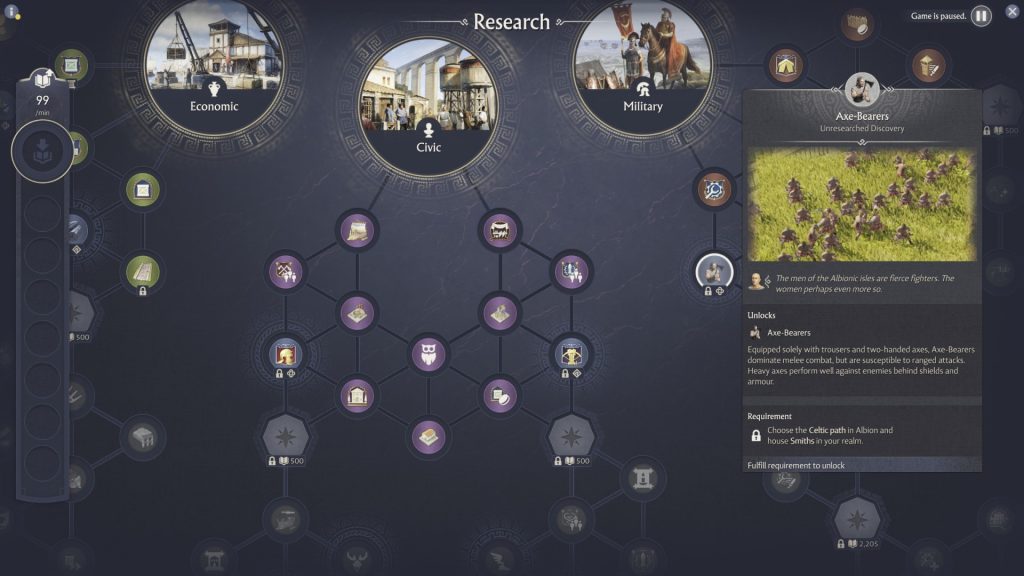
While I didn’t get to explore the combat facet of Pax Romana within the part of the story campaign I was able to share in my preview, the city-building aspect of the game is honestly more than enough fun to keep my occupied, and the optional objectives and story-based cutscenes were engaging enough to make me very excited for the full campaign on launch.
Just make sure you have a beefy enough rig to appreciate Pax Romana in full; I played the preview build at an upscaled 1440p resolution targeting 60 fps and found I had to spend some time fine-tuning most settings to medium or low and heavily rely on DLSS (Balanced) to maintain my desired frame-rate on my Ryzen 3600 / RTX 3060 Ti gaming rig.
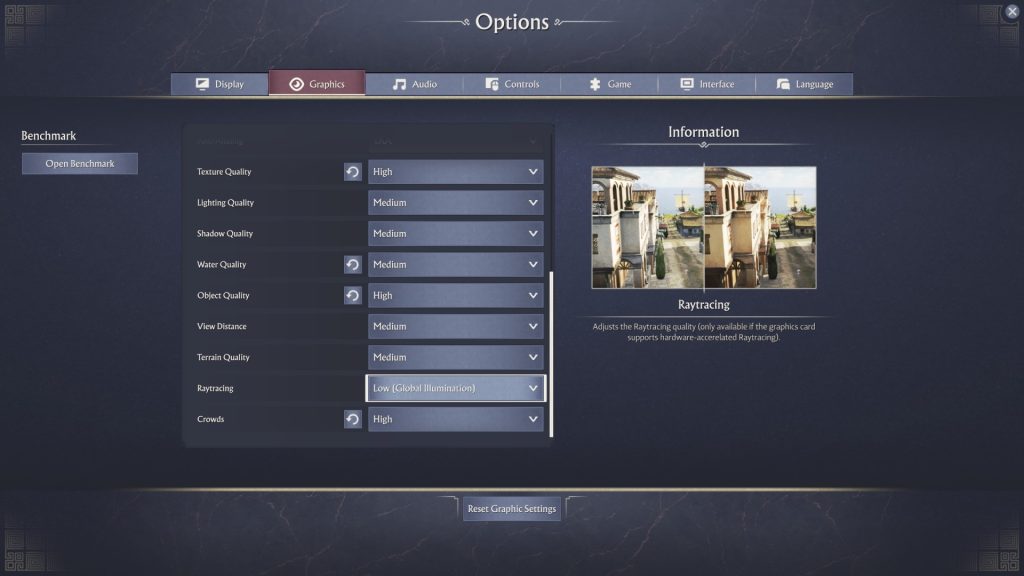
It’s definitely a more CPU-bound game owing to the genre’s demand for real-time simulation, which you can appreciate when zooming in to admire the little details of your cities, such as the Liberatus going about their day to deliver goods or the wealthier classes prancing around in the forest and temples without a care in the world. Such detail makes me both very curious and a little worried about how the PS5 and Xbox Series versions will perform in terms of frame-rate.
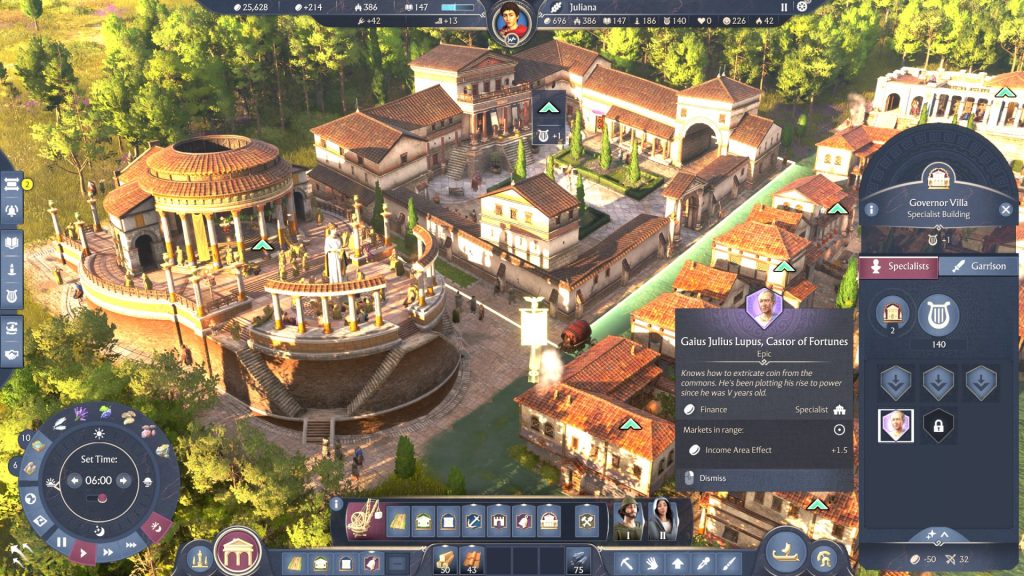
Initial impressions
Anno 117: Pax Romana is a RTS game to watch out for this November if you’re in the mood for some slower-paced and in-depth city-building of your own slice of Roman empire – or Albion, given the sandbox mode, available now in the public demo, lets you play and build from the Celtic perspective, which can’t be more different than the imperial rule in terms of aesthetic and playstyle. Festina Lentē!
